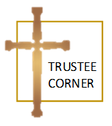|
The short version of what we believe are the three historic creeds of the Christian Church: the Apostles Creed, the Nicene Creed and the Athanasian Creed. We confess all the doctrines contained in these creeds to be true.
The importance of sound doctrine
The centrality of Christ
The inerrancy of Scripture
Law and Gospel One way of looking at Scripture is to divide it into two categories, Law and Gospel. If what you are reading is telling you to do something, it is Law; if it is telling you something God did, is doing, or will do for you, it is Gospel. The Law The Law has three purposes:
The Gospel is the best news that anyone could ever hear. The Gospel gives life, sets free, forgives and empowers. The Gospel is simply this: that God sent Jesus to bear our sin and be our Savior, that forgiveness of sins and eternal life are free gifts of God—not things to be earned through a process of good works or intellectual decision—and that we have been accepted by God on account of Christ and have eternal life. Salvation
The Sacraments We believe that a “Sacrament” is when God attaches the promise of forgiveness of sins to a physical element. We believe that, according to Scripture, God has done this two times. Those two times are Baptism and the Lord’s Supper. Baptism It’s hard to find another practice in the Christian church that has created more division than Baptism. It seems like every denomination, or even every Christian congregation, has a different understanding of Baptism. So here’s ours.
The Lord’s Supper
The Church
The Parousia (The Last Day)
Final Thoughts There’s a lot more to the Christian faith than what’s written here. We didn’t talk about things like hell, the role of clergy, the structure of ministry at Zion, our stance on different social and political issues, the role of women in the church, and our take on the beliefs and practices of other denominations or world religions (just to name a few). What’s written here are the basics of the faith we confess, a faith that has its beginning and end in Jesus Christ and that trusts in Him, and Him alone, for forgiveness, life, and salvation. |
The Lutheran Confessions
Drawn from God’s Word, the Lutheran Confessions are a true and binding exposition of Holy Scripture and serve as authoritative texts for all pastors, congregations and other rostered church workers of The Lutheran Church—Missouri Synod. What are the Lutheran Confessions? The Lutheran Church—Missouri Synod accepts the Scriptures as the inspired and inerrant Word of God, and the LCMS subscribes unconditionally to all the symbolical books of the Evangelical Lutheran Church as a true and unadulterated statement and exposition of the Word of God. We accept the Lutheran Confessions as articulated in the Book of Concord of 1580 because they are drawn from the Word of God, and on that account we regard their doctrinal content as a true and binding exposition of Holy Scripture and as authoritative for all pastors, congregations and other rostered church workers of The Lutheran Church—Missouri Synod. Read and Download the Lutheran ConfessionsThe texts above are in the public domain. They may be copied and distributed freely. The source of these translations is Triglot Concordia: The Symbolical Books of the Evangelical Lutheran Church (St. Louis: Concordia Publishing House, 1921). Below is a link to the on-line version of The Book of Concord. “What About?” Series
“What About?” is a series of 27 pamphlets, written by former Synod President Rev. Dr. A.L. Barry, that address doctrinal topics, moral issues and concerns in the church to help Christians grow in their understanding of these important questions.
LCMS RESOURCES |
|
Zion Lutheran Church -
Painesville Ohio Pastor Kurt Ziemann phone: 440 357-5174 Pastor Travis Henry email: [email protected] Deaconess Intern Elizabeth Dobbelaire Worship Times: Traditional Contemporary Saturday 6:30pm Sunday 11:30am Sunday 9:ooam |






